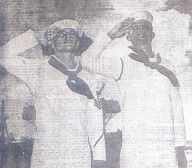|
The vessel before you is a heavy cruiser. Its men and its weapons are geared for immediate action on any sea. It can range for miles and months without basing, and it is the greatest enemy known to the maritime commerce of the world, for clean strikes swiftly and disappear suddenly.
A heavy cruiser is the rattlesnake of the United States fleet; it is the epitome of coordinated, tense nerve; it is an engineering masterpiece.
But no vessel, no matter how perfect it may be mechanically, can be an effective weapon for the United States Navy unless its men are just as effective.
There must be high morale; there must be sympathy, understanding and respect between crew and officers; there must be a job for every man to do and that job must be done to the best of his ability.
There is no room for slackers in the hold of a ship which must count for its very life on those who pilot her -- and one man, by one slip, may send his vessel, his fellow seamen, and himself to the bottom of the ocean.
The Navy, therefore, must constantly be building its men -- mentally, physically, and morally. Building them not only to be good sailors and good Americans, but good warriors and good neighbors.
Last week, we went aboard a heavy cruiser to see how "construction" work is progressing. For out purpose, we selected two members of the crew of the cruiser -- a machinist first class and a seaman first class -- to discover how they live and learn in a Navy which must ever be ready for a struggle.
We followed our effective "guinea pigs" through an entire day aboard ship, and we found them well trained, alert, not-too-carefree young men who know they have to play just as big a part in war as their commanding officers, and who have learned that team work is a pre-requisite for a successful ship.
We experimented with James A. "Jimmy" Woods, Machinist First Class in the morning, and with John H. Mizell, Seaman First Class in the afternoon.
23 year old Woods has been in the Navy 5 1/2 years and is studying to be a chief petty officer. He has chosen the Navy as a career and hopes to attain a warrant officers' commission some day.
Reveille sounds for Woods at 5:30 in the morning, but he usually "sleeps in" until 6:30. His bunk mates (one above, one below, three across the aisle) will tell you he's a sound sleeper who requires plenty of prodding before he leaps out of bed.
Woods is at chow in the noisy mess hall at 7:15. Food is ample and plenty, for the cruiser's captain says a well-fed man is a well-working machine.
At 7:30, he is off to the bowels of the cruiser. A chief petty officer is his immediate superior, and work for the day is cut out by him for each man in his section.
Repairing a giant turbine was one of Jimmy's jobs the morning we spent with him, and the mighty, complex piece of machinery was getting a complete face-washing at the hands of six sailors.
Later in the morning, he was assigned to polish brass on the intricate switchboard which controls the propelling power of the cruiser.
When the ship is in action, he frequently handles them -- 107,000 horsepower ready to respond to a flick of his wrist.
At 11 o'clock, work was halted and Woods -- and his co-machinist -- scrambled topside. Jimmy headed first for the recreation room and his pay. His salary is $92.40, but he only gets $32.40 a month. The remainder is sent to his mother or is put in the bank.
He changed back into whites again, washed up, and was in line when the "soupey, soupey, soupey" trumpet clattered forth at 11:15. Lunch is a man's meal ... great hunks of fresh bread with plenty of butter, a mug of thick soup, generous helpings of baked ham, creamed corn, mashed potatoes, a husky slab of apple pie and cooling glasses of lemonade.
After lunch, Jimmy had time for a hair cut, to write a few letters (which are mailed aboard ship in a branch of the New York post office -- the cruiser’s home port) and, play several hands of acey-deucey.
Acey-Deucey, traditional navy game, is played without benefit of stakes. A rigid non-gambling rule, ordered because it preserved tempers and pay, is just as rigidly enforced today as ever. Most of the men -- including Woods -- are just as glad to play for the fun of it.
He's on duty again in the engine room from 1 to 3:30, tooling machines or cleaning up, or perhaps taking a course on some newly-installed piece of equipment.
At 3:30 every other day, Jimmy is off duty until the following morning at 5:30 a.m.. Other days, he stands a 4 to 8 watch.
Woods doesn't smoke, and drinks beer only occasionally. He attends the movies, plays cards, reads, or listens to the radio nights he is aboard ship, and usually turns in early.
Afternoons off, he frequently goes to the Navy's Aica playground, and swims or plays baseball.
He has applied to the Navy for an enlisted man's commission in the air force, and thinks he has a chance for an early opening. He subscribes to Time regularly, and buys aviation magazines whenever he has spare cash.
He says he is "pretty non-political with things as they are today," but admits he is a Democrat and would have voted for Roosevelt in the last election.
Does he like the Navy?
"You bet your life I do, mister! It's taught me everything I know and I like most everything about it. I'm coming up for promotion soon. If I make it I'll be the happiest guy going. If I don't, well -- just have to try again, that's all. It's going to be a full-time career for me!"
Woods, you can see, will never worry the fleet recreation and morale officer. He knows what he's doing and what he wants -- and he's working for it. Industry, Navy men will tell you, is the best cure in the world for homesickness or discontent.
In jobs, that of 24 year old John Mizell is in direct contrast to that of Jimmy Woods.
He is on deck all day, and has one of the most important battle stations -- as loader on an antiaircraft gun which protects the bridge.
Mizell, a former Texas oil field worker, entered the Navy because he wanted to avoid the draft and figured he could gain needed knowledge of various subjects.
His day begins at 5:30 in the morning -- there is no sleeping in for him. From 6 until 7:15 he is on deck duty -- scrubbing, cleaning, and painting.
He "chows" at the same time and returns to work about 8 in the morning in charge of the gear locker. Mizell rations out ropes and tools for cleaning and painting the vessel and keeps track of materials used. His actual deck job is simple -- but he must do a score of other chores which Woods, as a machinist, does not have.
As a loader of a gun crew, Mizell must train constantly while the cruiser is at sea. There can be no room for faltering or slow loading when a gun is protecting the men who command a ship. Mizell and his fellow gun crew sailors know that -- and they work with nervous speed during maneuvers.
When the vessel is anchoring, he wields the sledge hammer which breaks the lock pinning the anchor to the cruiser. He has to swing deftly and step back smartly -- if those speeding, gigantic links -- each one weighs more than 50 pounds -- were ever to trip him, he would be mangled in their rush seaward; it calls for accurate timing.
More than one sailor has been seriously injured by slow actions.
|
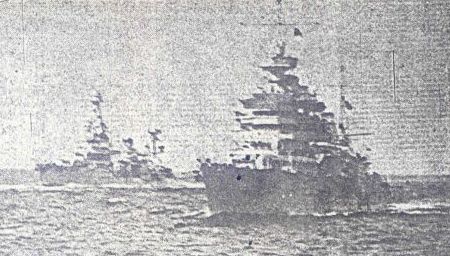 The sleek black hull before you is an instrument of death. It has turrets which can belch tons of murderous shells hourly; it has machine guns and anti-aircraft guns to sweep the skies of dive bombers which would toy with it; it has airplanes and secret instruments to detect lurking enemy submarines, and depth charges to destroy a U-boat in seconds.
The sleek black hull before you is an instrument of death. It has turrets which can belch tons of murderous shells hourly; it has machine guns and anti-aircraft guns to sweep the skies of dive bombers which would toy with it; it has airplanes and secret instruments to detect lurking enemy submarines, and depth charges to destroy a U-boat in seconds.
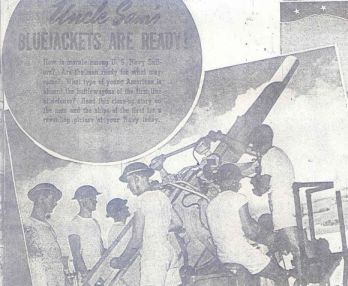
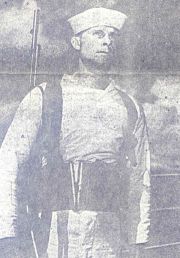
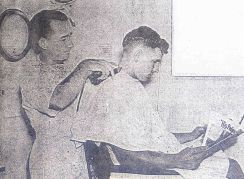
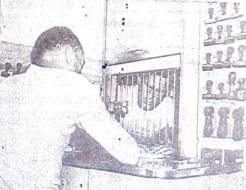
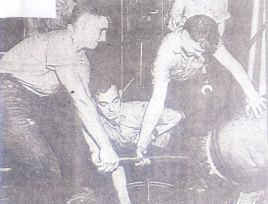
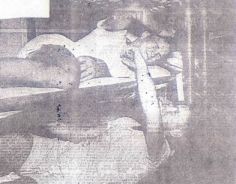
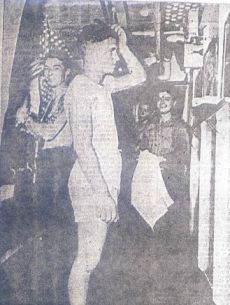
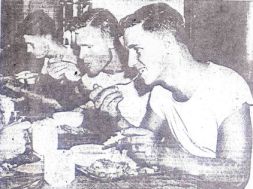
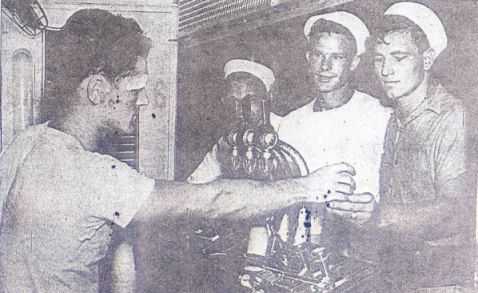
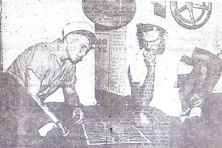
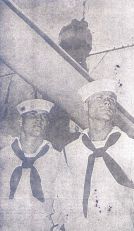 Power Personified
Power Personified